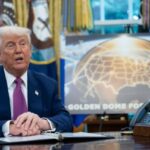Why should we be surprised when Donald Trump issues executive orders to expedite deep-sea mining in international waters despite consensus from the International Seabed Authority (ISA) that opposes the practice? Nearly every country in the world has signed on to the Law of the Sea United Nations treaty, but not the United States. That treaty states that mining outside a country’s territorial waters without agreement breaches international law. Since the U.S. is not a signatory, one can see why Trump would happily give the U.N. the finger. But why he is doing this is peculiar since the only company affected by his executive order is a Vancouver-based Canadian miner, The Metals Company (TMC), which has been lobbying the U.S. administration for the right to mine parts of the Pacific Ocean bottom, even in areas outside American jurisdiction.
TMC holds licenses with three Pacific island nations: Nauru, Tonga and Kiribati. These licenses cover 224,533 square kilometres (86,679 square miles) of the seabed within their territorial waters. That’s where the company wants to harvest nickel, copper, cobalt and manganese nodules using robots. TMC has Korean and Japanese partners and claims that its method of mining the sea floor will not cause irreversible damage to the flora and fauna of the Pacific seabed.
Why Trump issued the executive order may have more to do with trying to beat the Chinese in a race to the bottom of the ocean. China has a stake in seabed mining, with three state-backed companies and Shanghai Jiao Tong University holding ISA-issued exploration contracts to run trials and prototype mining equipment to use to pluck deep-sea nodules from the seafloor. As of yet, these four have not launched commercial mining operations.
In response to the Trump executive order, ISA issued a statement noting that The United Nations Convention on the Law of the Sea, established in 1994, is the sole body and framework for governing the world’s oceans and international law, and that no country can “claim, acquire, or exercise sovereignty or sovereign rights over any part” of the global ocean or its mineral resources. The Convention established the ISA to oversee “all activities related to mineral resources” and that this “common understanding” is “binding on all States.”
The ISA’s interpretation of the Trump executive order is that it can only apply to resources found on the seabed under its territorial control and that any unilateral action was illegal. The ISA seeks a consensus from the international community to establish a mining code for the seabed that benefits all humanity while protecting the marine environment. To date, it is not clear that any deep-sea mining company meets those two criteria.
On July 21, 2025, the latest ISA meeting in Kingston, Jamaica, called for a continuing prohibition on deep-sea mining, having not adopted a mining code to govern such operations. Stated Sofia Tsenikli, from the Deep Sea Conservation Coalition (DSCC), “Deep-sea mining has already proven itself to be a rogue and toxic industry, and rushing to mine the ocean represents a shortcut to disaster.” She urged that ISA spend the time not trying to regulate deep-sea mining, but rather “protecting the deep sea, the common heritage of humankind…our planet’s last pristine areas.”
The two-week conference in Kingston described the challenges of coming to a common agreement, pointing to environmental, financial, regulatory, procedural and governance disagreements among those participating.
As for TMC and its licenses with Pacific island nations, its actions have been described as causing chaos as the company attempts to subvert the ISA. Research points to potential irreversible biodiversity loss or long recovery periods for the ocean floor based on the revisiting of previous small-scale experiments on the ocean floor to mine nodules 44 years ago off Hawaii. In addition, the sediment plumes caused by the mining could harm seafloor life, while noise caused by the machinery could disturb whales, dolphins and other sea creatures. Even the recent discovery of dark oxygen at the bottom of the ocean could be affected with unknown consequences to seafloor ecosystems.
Its CEO, Gerard Barron, believes concerns are over the top and recently told CNN, “The notion that we don’t know enough about this environment is blatantly wrong. We’re not saying there’s zero impact. We’re just saying the impact is a fraction compared to the known set of impacts that are happening today on land.”
Matthew Gianni, a Co-Founder of DSCC, disagrees, stating, “It must be clear by now to TMC and its subsidiaries that they face a significant risk of losing their exploration contracts. The ISA is obliged to act for the benefit of humankind as a whole, the Common Heritage Principle, and not for the benefit of companies prepared to undermine international law to make a profit at the expense of the health of our ocean.”
Since the issuance of the Trump executive order, Impossible Metals, a California-based company, has applied to mine the seafloor off American Samoa and is attempting to raise US$1 billion. In addition, Lockheed Martin has indicated interest in giving seabed miners access to international areas of the Pacific that it has licensed from the U.S. government.
TMC has told its investors that it expects to be mining within a year, even though the U.S. lacks the technology to refine the nodules that the company intends to harvest. Those technologies exist in China, Japan, and the European Union, with all of these ISA member governments expressing opposition to unilateral mining of the seafloor without a collective agreement. Since the Trump announcement and the proclamation by ISA, the Japanese company that is partnering with TMC told its investors, it would only “launch operations once the international rules are finalized.”









